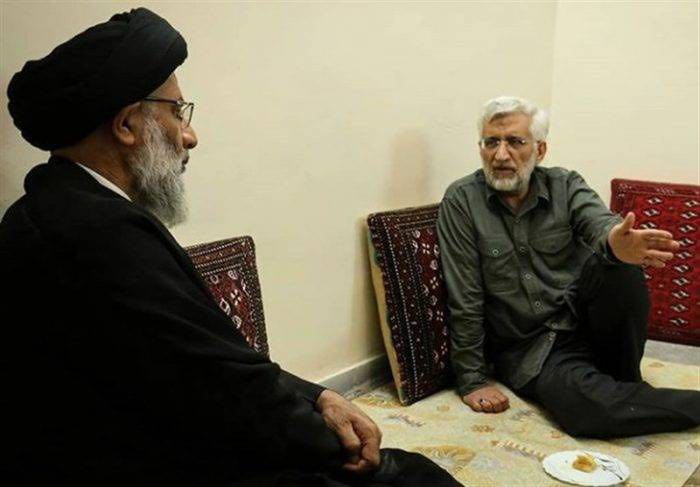Saeed Jalili is an obstacle to the JCPOA agreement
Saeed Jalili is an obstacle to the agreement. Scattered news from within the principlist camp indicates a serious conflict not only over accepting or rejecting U.S. conditions but also over the entirety of the negotiations. Continuing or halting them is a major issue, with the Resistance Front led by Saeed Jalili being its most serious leader.
This can be gleaned from the harsh and even threatening tweets of the Resistance Front members directed at Raisi and his team. While news suggests that Iran is preparing to sign a revival of the JCPOA in the form of a new agreement, it must be said that if the negotiations fail, this group should be considered the main culprit.
Jalili’s opinion from his close associates
To avoid being labeled as an opponent of the agreement, Saeed Jalili has remained silent for now, but his media arms and close associates are active. Amirhossein Sabati, a television host close to Saeed Jalili, writes that the original JCPOA did not bring any benefits to the country, so why are you so desperately seeking to revive this colonial agreement?
And Abbas Ranjbar, Saeed Jalili’s office manager, tweeted last week that reviving the spirit of the JCPOA and the discredited notion of solving livelihood issues through compromise is conditioning the economy and imposing self-sanctions against domestic institutions, granting the U.S. and Israeli spies the extraordinary leverage of the snapback mechanism and inspections. Mr. Raisi and Bagheri, you are directly responsible for the consequences of this decision. Observers have assessed this tweet as a proxy warning from Saeed Jalili through his office manager.
Minimum standards not met
Simultaneously, tweets from Ali Khazrian, a member of the Resistance Front in the parliament and a member of the National Security Commission, reflect the Resistance Front’s view on the agreement process. In his latest tweet on this matter, he wrote that despite all the existing flaws regarding the lack of real guarantees and verification of sanctions lifting in the Vienna negotiations draft, the Americans are still seeking excessive demands. The appropriate response is that whenever the U.S. lifts the sanctions, Iran will fulfill its commitments under the JCPOA, and this matter does not require negotiation.
Two weeks ago, in a thread of tweets, he emphasized that the EU’s proposed agreement text lacks the minimum essentials of a good agreement aligned with the policies of the Islamic Republic of Iran. He wrote that setting any deadline for an agreement without addressing these issues is unacceptable. He stated that, according to the latest reports from the Vienna negotiations, unfortunately, the draft agreement to revive the JCPOA is still far from the country’s definitive policy.
According to him, the text still uses the U.S. President’s speech as a guarantee, and the verification of lifting sanctions has been entrusted to the U.S. instead of Iran. The minimum essentials of a good agreement, such as lifting oil and banking sanctions, closing the remaining issues with the International Atomic Energy Agency, converting oil sale revenue to the required currency, and identifying customers to establish problem-free commercial and economic relations, have not been resolved in the draft.
One of the dangers that prevents the completion of negotiations and allows the West to gain concessions from Iran on issues beyond nuclear, such as defense and regional matters, is the non-resolution of the sanctions issue in the agreement and deferring it to after the agreement.
It’s the same Rouhani agreement
In April, Mahmoud Nabavian, another member of the Resistance Front, criticized in a note that the same conditions not met by Rouhani and his team were also not met by Bagheri Kani, and in his view, no difference has occurred in this regard. By conditions, he meant the removal of all sanctions and the U.S. guaranteeing not to exit the JCPOA.
Nabavian also pointed out the Strategic Action Plan to Lift Sanctions, which has been ignored in Raisi’s government and not reported to parliament. He wrote that despite all this, the red lines of the system have not been observed in the obtained draft. According to Nabavian’s claim, the negotiating team accepted Biden’s promotional speech at the G20 summit as a guarantee.
Last winter, it was revealed that Saeed Jalili sent a 200-page letter to the Leader. Although he reacted by saying, ‘I have always had correspondence and consider it my duty to express my opinions. The previous government provided a report on the JCPOA at the end of its term. I reviewed it and pointed out the aspects that did not match reality. This letter was related to six months ago and was a critique of the previous government’s report on the JCPOA achievements. However, these issues are not worth focusing on.
It was said that Jalili had previously and before sending this letter, been in contact with Hossein Amir-Abdollahian, the Foreign Minister, and Ali Bagheri Kani, his political deputy and head of Iran’s negotiating team in the Vienna talks to revive the JCPOA. Failing to persuade them, he resorted to writing to the Leader.

